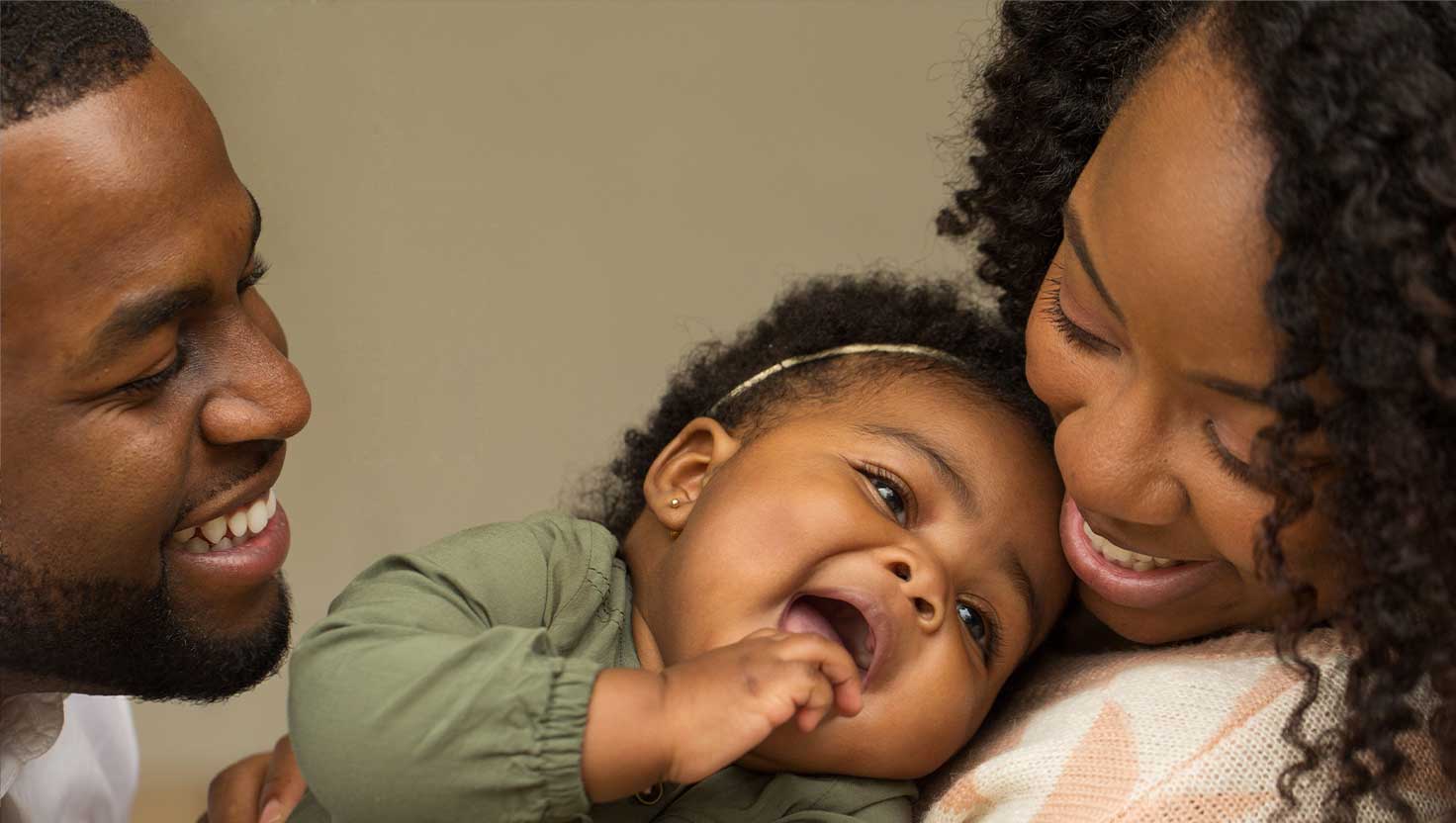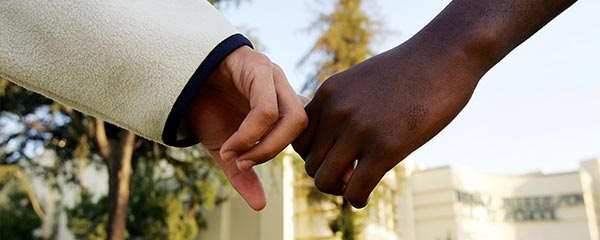WASHINGTON, D.C. -- This month, the Gallup Center on Black Voices celebrates its one-year anniversary. In July of last year, Gallup made a 100-year commitment to study the experiences and life outcomes of the more than 40 million adult Black Americans.
At that time, the highest percentage of Americans since 1968 considered race relations the most important problem facing the U.S. -- and the issue has remained relatively elevated since.
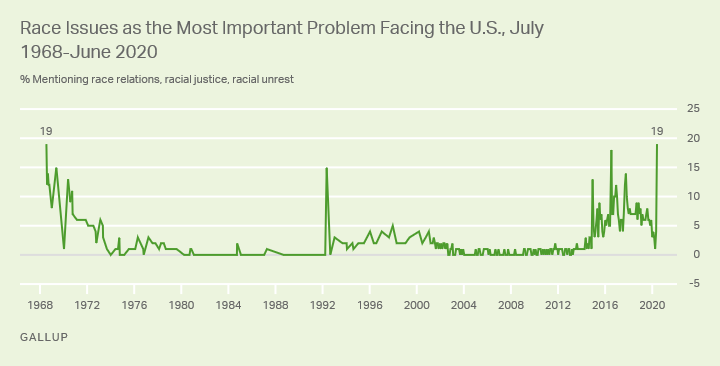
Line graph. Americans' mentions of race relations or racism as the most important problem facing the U.S., from July 1968 to June 2020. In June 2020, 19% of Americans named race relations or racism as the greatest problem facing the U.S.
The protests that erupted after George Floyd's murder last year drew widespread public support, including 92% among Black Americans. More than one in four young adults, aged 18 to 29, said they participated in a protest about racial justice and equality.
| Support protests | |
|---|---|
| % | |
| U.S. adults | 65 |
| Black adults | 92 |
| GALLUP PANEL, JUNE 23-JULY 6, 2020 | |
Two in Three Americans Support Racial Justice Protests
The Black Experience With Police in the U.S.
Black Americans are less likely than other groups to feel confident about being treated respectfully in interactions with police in their area.
| Very confident | Somewhat confident | Not too confident | Not at all confident | |
|---|---|---|---|---|
| % | % | % | % | |
| U.S. adults | 48 | 37 | 11 | 4 |
| Black adults | 18 | 43 | 27 | 12 |
| GALLUP PANEL, JUNE 23-JULY 6, 2020 | ||||
Not only are Black Americans much less likely to feel confident that they would be treated with courtesy and respect, but they are far more likely to say they know people who were treated unfairly by the police, unfairly sent to jail or stayed in jail because they didn't have enough bond money. Young Black adults are even more likely to know people who have experienced mistreatment from the police and the justice system -- and are more likely to know someone who remained in jail because they could not afford bail.
| Treated unfairly by police | Unfairly sent to jail | Stayed in jail because they didn't have enough bail money |
|
|---|---|---|---|
| % A lot/some | % A lot/some | % A lot/some | |
| U.S. adults | 41 | 19 | 23 |
| Black adults | 71 | 50 | 51 |
| Black adults aged 18-44 | 83 | 61 | 56 |
| GALLUP PANEL, JUNE 23-JULY 6, 2020 | |||
Black Adults More Likely to Know People Mistreated by Police
Confidence in the police, more generally, continues to lag among Black Americans, with far fewer having a great deal or quite a lot of confidence than is true for White Americans.
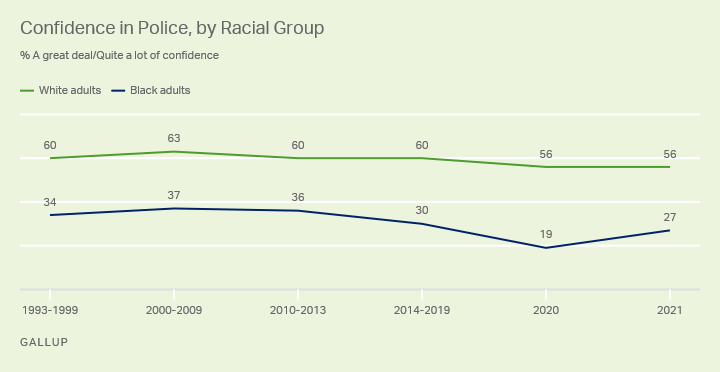
Line graph. Americans' confidence in the police. In 2021, 56% of Americans say they have a great deal or quite a lot of confidence in the police, compared to 27% of Black Americans.
In U.S., Black Confidence in Police Recovers From 2020 Low
Despite their subdued confidence in the police and broad awareness of negative experiences, the majority of Black Americans would prefer that police maintain their current presence in their area. Meanwhile, as many would rather the police spend more time in their area as want them to spend less time.
| More time | Same amount of time | Less time | |
|---|---|---|---|
| % | % | % | |
| U.S. adults | 19 | 67 | 14 |
| Black adults | 20 | 61 | 19 |
| GALLUP PANEL, JUNE 23-JULY 6, 2020 | |||
Black Americans Want Police to Retain Local Presence
Black Americans are much less likely than White Americans to feel safe walking alone at night in the city or area where they live -- and Black women feel even less safe.
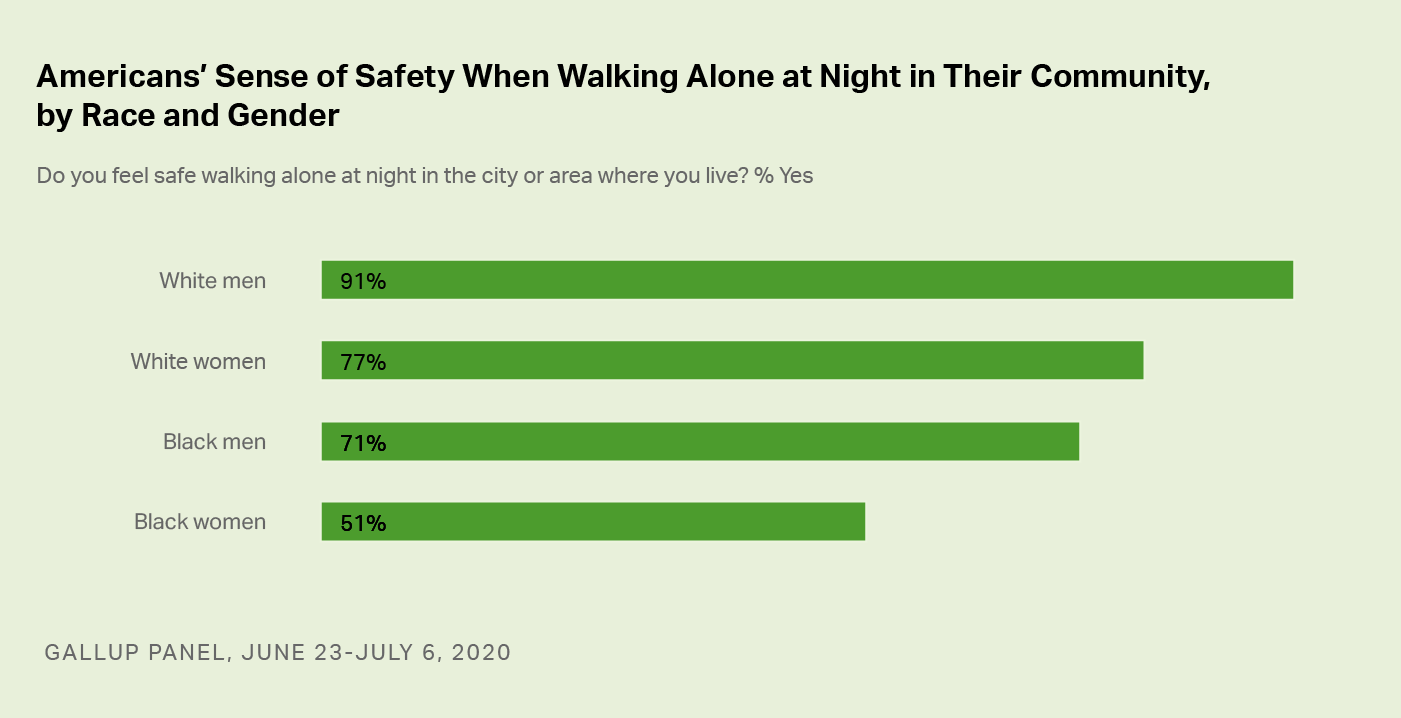
Bar graph. Americans' sense of safety when walking alone at night in their community, by race. Ninety-one percent of White men, 77% of White women, 71% of Black men and 51% of Black women feel safe walking alone at night in the city or area where they live.
Black Americans Less Likely to Feel Safe in Their Community
When it comes to police reform, nearly all Americans believe that policing in the U.S. needs major or minor changes. Nearly nine in 10 Black Americans believe major changes are needed.
| Major changes needed | Minor changes needed | No changes needed | |
|---|---|---|---|
| % | % | % | |
| U.S. adults | 58 | 36 | 6 |
| Black adults | 88 | 10 | 2 |
| GALLUP PANEL, JUNE 23-JULY 6, 2020 | |||
Most Americans Say Policing Needs 'Major Changes'
Some policing reforms enjoy broad support across racial and party lines.
| U.S. adults | Black Americans | |
|---|---|---|
| % | % | |
| Changing management practices so officers with multiple incidents of abuse of power are not allowed to serve | 98 | 99 |
| Requiring officers to have good relations with the community | 97 | 97 |
| Changing management practices so officer abuses are punished | 96 | 98 |
| Promoting community-based alternatives such as violence intervention | 82 | 94 |
| Ending stop and frisk | 74 | 93 |
| Eliminating police unions | 56 | 61 |
| Eliminating officer enforcement of nonviolent crimes | 50 | 72 |
| Reducing the budgets of police departments and shifting the money to social programs | 47 | 70 |
| Abolishing police departments | 15 | 22 |
| GALLUP PANEL, JUNE 23-JULY 6, 2020 | ||
Black Opportunities and Experiences of Mistreatment
But the national conversation didn't stop with policing. Americans were beginning to acknowledge the racial disparities that exist in other systems in the U.S, including education, housing and job opportunities.
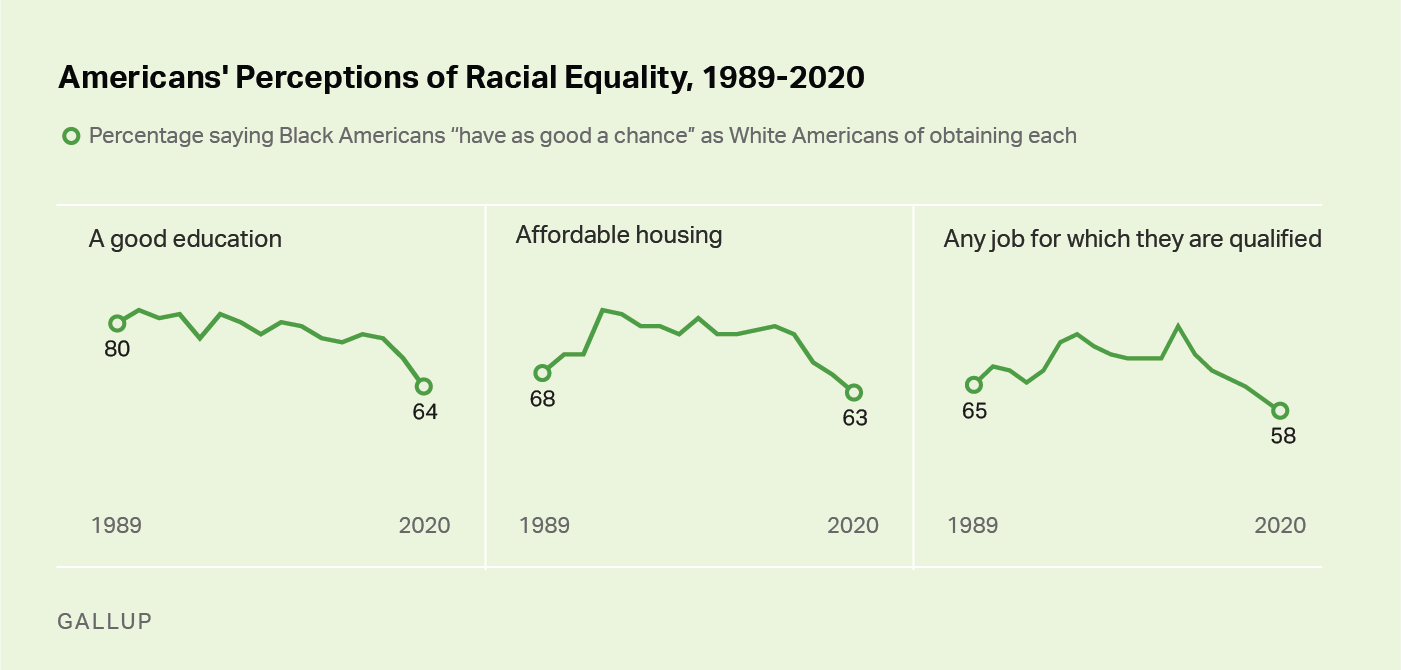
Three line graphs. U.S. adults' perceptions of Black Americans' opportunities for a good education, affordable housing and getting a job for which they are qualified. In 2020, 64% said Black Americans "have as good a chance" as White Americans to get a good education; 63% said they have as good a chance to get affordable housing; and 58% said they have as good a chance of getting any job for which they are qualified.
Optimism About Black Americans' Opportunities in U.S. Falls
One in four Black workers reported experiences of discrimination at their jobs in the past 12 months.
| Yes | |||||||||||||||||||||||||||||||||||||||||||||||||||||||||||||||||||||||||||||||||||||||||||||||||||
|---|---|---|---|---|---|---|---|---|---|---|---|---|---|---|---|---|---|---|---|---|---|---|---|---|---|---|---|---|---|---|---|---|---|---|---|---|---|---|---|---|---|---|---|---|---|---|---|---|---|---|---|---|---|---|---|---|---|---|---|---|---|---|---|---|---|---|---|---|---|---|---|---|---|---|---|---|---|---|---|---|---|---|---|---|---|---|---|---|---|---|---|---|---|---|---|---|---|---|---|
| % | |||||||||||||||||||||||||||||||||||||||||||||||||||||||||||||||||||||||||||||||||||||||||||||||||||
| U.S. employees | 18 | ||||||||||||||||||||||||||||||||||||||||||||||||||||||||||||||||||||||||||||||||||||||||||||||||||
| Black employees | 24 | ||||||||||||||||||||||||||||||||||||||||||||||||||||||||||||||||||||||||||||||||||||||||||||||||||
| Hispanic employees | 24 | ||||||||||||||||||||||||||||||||||||||||||||||||||||||||||||||||||||||||||||||||||||||||||||||||||
| White employees | 15 | ||||||||||||||||||||||||||||||||||||||||||||||||||||||||||||||||||||||||||||||||||||||||||||||||||
| Gallup Panel, Nov. 6-Dec. 1, 2020 | |||||||||||||||||||||||||||||||||||||||||||||||||||||||||||||||||||||||||||||||||||||||||||||||||||
One in Four Black Workers Report Discrimination at Work
A more recent survey, which asked respondents about their experiences in the past 30 days, found that more than a third of Black Americans had experienced unfair treatment in a store while they were shopping. More than one in five reported similar experiences in a restaurant, bar, theater or other entertainment place.
| Yes, treated unfairly | |
|---|---|
| % | |
| In a store where you were shopping | 35 |
| In a restaurant, bar, theater or other entertainment place | 21 |
| In dealings with the police, such as traffic incidents | 20 |
| At your place of work | 17 |
| While getting healthcare for yourself or a family member | 17 |
| GALLUP, JUNE 1-JULY 5, 2021 | |
Black Americans' Reports of Mistreatment Steady or Higher
Black Americans are more likely than other groups to report having been on the receiving end of microaggressions, including receiving worse service at restaurants and stores, and people treating them with fear or with less respect or courtesy than other people.
| Very often/Often | |
|---|---|
| % | |
| People acted as if they were better than you | 32 |
| People acted as if they thought you were not smart | 25 |
| You were treated with less courtesy than other people | 22 |
| You were treated with less respect than other people | 20 |
| People acted as if they thought you were dishonest | 19 |
| People acted as if they were afraid of you | 18 |
| You received worse service than other people at restaurants or stores | 14 |
| GALLUP PANEL, JUNE 23-JULY 6, 2020 | |
The impact of discrimination at work on Black employees who report having experienced discrimination is heavier than is the case for White employees. Fewer Black employees who were discriminated against are considered "thriving" in their life evaluation ratings than Black employees who did not experience discrimination.
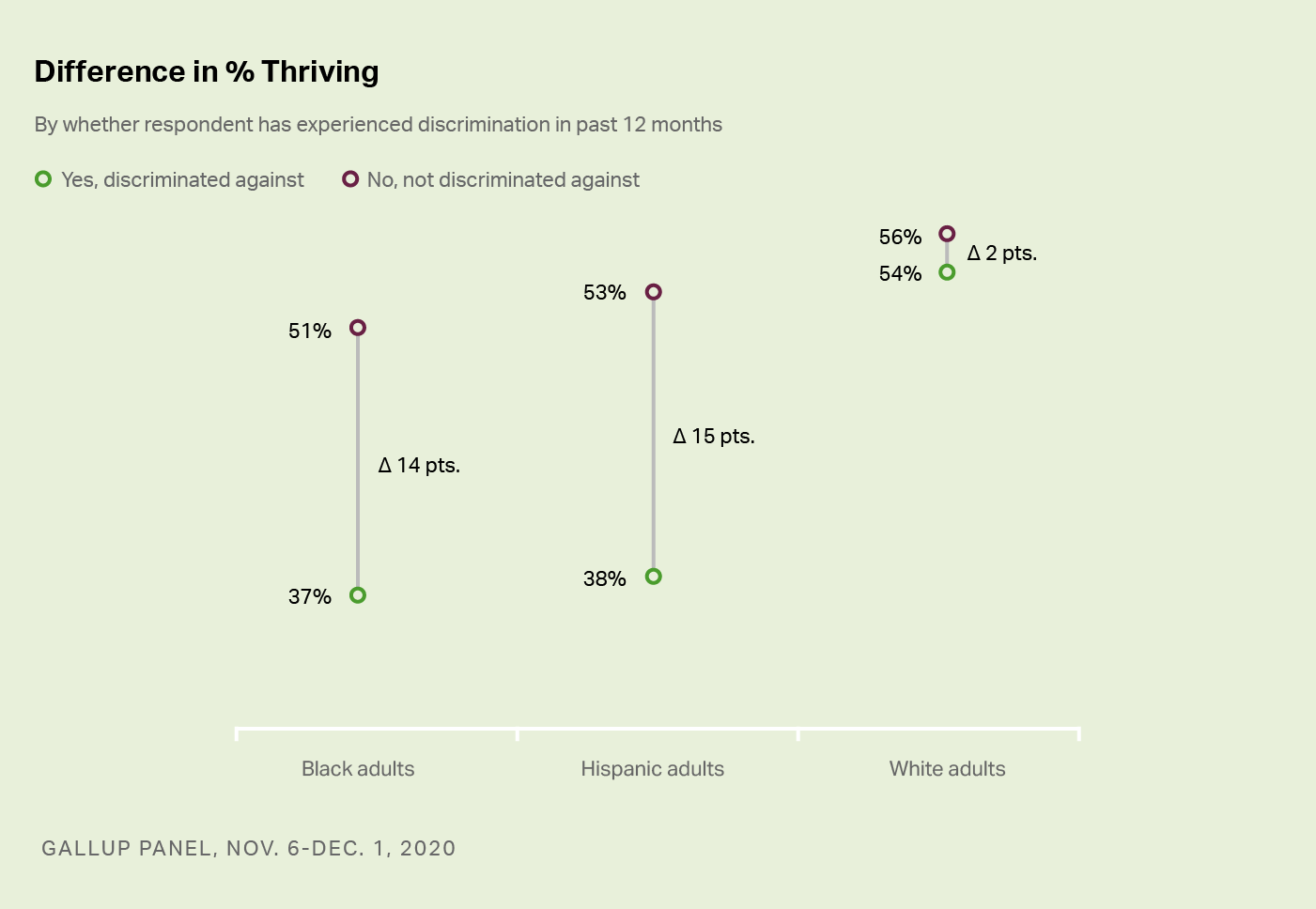
Three vertical line graphs. Percentage "thriving" among U.S. adults who did and did not experience discrimination at work in the past 12 months. 51% of Black workers who did not experience discrimination are thriving, while 37% of those who did experience discrimination are thriving.
Understanding the Effects of Discrimination in the Workplace
Black Americans are also less likely to report having leaders of their own race or ethnicity at work.
| Black workers | White workers | Hispanic workers | |||||||||||||||||||||||||||||||||||||||||||||||||||||||||||||||||||||||||||||||||||||||||||||||||
|---|---|---|---|---|---|---|---|---|---|---|---|---|---|---|---|---|---|---|---|---|---|---|---|---|---|---|---|---|---|---|---|---|---|---|---|---|---|---|---|---|---|---|---|---|---|---|---|---|---|---|---|---|---|---|---|---|---|---|---|---|---|---|---|---|---|---|---|---|---|---|---|---|---|---|---|---|---|---|---|---|---|---|---|---|---|---|---|---|---|---|---|---|---|---|---|---|---|---|---|
| % | % | % | |||||||||||||||||||||||||||||||||||||||||||||||||||||||||||||||||||||||||||||||||||||||||||||||||
| 5 "Strongly agree" | 37 | 55 | 40 | ||||||||||||||||||||||||||||||||||||||||||||||||||||||||||||||||||||||||||||||||||||||||||||||||
| 4 | 22 | 24 | 25 | ||||||||||||||||||||||||||||||||||||||||||||||||||||||||||||||||||||||||||||||||||||||||||||||||
| 3 | 19 | 13 | 18 | ||||||||||||||||||||||||||||||||||||||||||||||||||||||||||||||||||||||||||||||||||||||||||||||||
| 2 | 11 | 4 | 10 | ||||||||||||||||||||||||||||||||||||||||||||||||||||||||||||||||||||||||||||||||||||||||||||||||
| 1 "Strongly disagree" | 11 | 4 | 8 | ||||||||||||||||||||||||||||||||||||||||||||||||||||||||||||||||||||||||||||||||||||||||||||||||
| GALLUP PANEL, NOV. 6-DEC. 1, 2020 | |||||||||||||||||||||||||||||||||||||||||||||||||||||||||||||||||||||||||||||||||||||||||||||||||||
Representation Shapes Black Employees' Work Experience
Many employers in the U.S. seek to respond to the national conversation on race, but managers on the front lines are unprepared for such conversations. Less than half of U.S. managers strongly agree that they are prepared to have meaningful conversations about race and equality with their teams.
| Strongly agree | |||||||||||||||||||||||||||||||||||||||||||||||||||||||||||||||||||||||||||||||||||||||||||||||||||
|---|---|---|---|---|---|---|---|---|---|---|---|---|---|---|---|---|---|---|---|---|---|---|---|---|---|---|---|---|---|---|---|---|---|---|---|---|---|---|---|---|---|---|---|---|---|---|---|---|---|---|---|---|---|---|---|---|---|---|---|---|---|---|---|---|---|---|---|---|---|---|---|---|---|---|---|---|---|---|---|---|---|---|---|---|---|---|---|---|---|---|---|---|---|---|---|---|---|---|---|
| % | |||||||||||||||||||||||||||||||||||||||||||||||||||||||||||||||||||||||||||||||||||||||||||||||||||
| Among all U.S. managers | 42 | ||||||||||||||||||||||||||||||||||||||||||||||||||||||||||||||||||||||||||||||||||||||||||||||||||
| Among managers who strongly agree their organization is committed to improving racial equality |
73 | ||||||||||||||||||||||||||||||||||||||||||||||||||||||||||||||||||||||||||||||||||||||||||||||||||
| Among managers who do not strongly agree their organization is committed to improving racial equality |
21 | ||||||||||||||||||||||||||||||||||||||||||||||||||||||||||||||||||||||||||||||||||||||||||||||||||
| Gallup Panel, Nov. 6-Dec. 1, 2020 | |||||||||||||||||||||||||||||||||||||||||||||||||||||||||||||||||||||||||||||||||||||||||||||||||||
Most U.S. Managers Not Fully Prepared to Talk About Race
Gallup Findings Throughout Black History
During the past year, we dug through our archives and revisited key moments in Black history.
- On Nov. 13, 1956, the Supreme Court struck down an Alabama law requiring segregated seating on city buses, trains and public waiting rooms. Several months later, Gallup found 60% of Americans supporting that ruling -- including 27% support in Southern states and 70% support outside the South.
| U.S. adults | South | Non-South | |||||||||||||||||||||||||||||||||||||||||||||||||||||||||||||||||||||||||||||||||||||||||||||||||
|---|---|---|---|---|---|---|---|---|---|---|---|---|---|---|---|---|---|---|---|---|---|---|---|---|---|---|---|---|---|---|---|---|---|---|---|---|---|---|---|---|---|---|---|---|---|---|---|---|---|---|---|---|---|---|---|---|---|---|---|---|---|---|---|---|---|---|---|---|---|---|---|---|---|---|---|---|---|---|---|---|---|---|---|---|---|---|---|---|---|---|---|---|---|---|---|---|---|---|---|
| % | % | % | |||||||||||||||||||||||||||||||||||||||||||||||||||||||||||||||||||||||||||||||||||||||||||||||||
| Approve | 60 | 27 | 70 | ||||||||||||||||||||||||||||||||||||||||||||||||||||||||||||||||||||||||||||||||||||||||||||||||
| Disapprove | 33 | 64 | 22 | ||||||||||||||||||||||||||||||||||||||||||||||||||||||||||||||||||||||||||||||||||||||||||||||||
| No opinion | 7 | 9 | 8 | ||||||||||||||||||||||||||||||||||||||||||||||||||||||||||||||||||||||||||||||||||||||||||||||||
| Gallup, July 18-23, 1957 | |||||||||||||||||||||||||||||||||||||||||||||||||||||||||||||||||||||||||||||||||||||||||||||||||||
Gallup Vault: 60 Years Ago, the End of "Separate but Equal"
-
The Civil Rights Act of 1964 was the final death knell to segregation in public places in the U.S. About six in 10 Americans approved of the legislation, though most (62%) supported a gradual approach rather than a strict enforcement from the beginning.
| U.S. adults | |||||||||||||||||||||||||||||||||||||||||||||||||||||||||||||||||||||||||||||||||||||||||||||||||||
|---|---|---|---|---|---|---|---|---|---|---|---|---|---|---|---|---|---|---|---|---|---|---|---|---|---|---|---|---|---|---|---|---|---|---|---|---|---|---|---|---|---|---|---|---|---|---|---|---|---|---|---|---|---|---|---|---|---|---|---|---|---|---|---|---|---|---|---|---|---|---|---|---|---|---|---|---|---|---|---|---|---|---|---|---|---|---|---|---|---|---|---|---|---|---|---|---|---|---|---|
| % | |||||||||||||||||||||||||||||||||||||||||||||||||||||||||||||||||||||||||||||||||||||||||||||||||||
| Approve | 59 | ||||||||||||||||||||||||||||||||||||||||||||||||||||||||||||||||||||||||||||||||||||||||||||||||||
| Disapprove | 31 | ||||||||||||||||||||||||||||||||||||||||||||||||||||||||||||||||||||||||||||||||||||||||||||||||||
| Don't know | 10 | ||||||||||||||||||||||||||||||||||||||||||||||||||||||||||||||||||||||||||||||||||||||||||||||||||
| Gallup for the Institute for International Social Research, September 1964 | |||||||||||||||||||||||||||||||||||||||||||||||||||||||||||||||||||||||||||||||||||||||||||||||||||
Gallup Vault: Americans Narrowly OK'd 1964 Civil Rights Law
-
The Voting Rights Act of 1965 was signed by President Lyndon Johnson to address the barriers to voting that were in place for many Black Americans. A Gallup poll taken months before its passage found that the legislation was favored by more than three in four Americans (76%) -- though by less than half of White Southerners (49%).
| U.S. adults% | White Southerners% | ||||||||||||||||||||||||||||||||||||||||||||||||||||||||||||||||||||||||||||||||||||||||||||||||||
|---|---|---|---|---|---|---|---|---|---|---|---|---|---|---|---|---|---|---|---|---|---|---|---|---|---|---|---|---|---|---|---|---|---|---|---|---|---|---|---|---|---|---|---|---|---|---|---|---|---|---|---|---|---|---|---|---|---|---|---|---|---|---|---|---|---|---|---|---|---|---|---|---|---|---|---|---|---|---|---|---|---|---|---|---|---|---|---|---|---|---|---|---|---|---|---|---|---|---|---|
| Favor | 76 | 49 | |||||||||||||||||||||||||||||||||||||||||||||||||||||||||||||||||||||||||||||||||||||||||||||||||
| Oppose | 16 | 37 | |||||||||||||||||||||||||||||||||||||||||||||||||||||||||||||||||||||||||||||||||||||||||||||||||
| No opinion | 8 | 14 | |||||||||||||||||||||||||||||||||||||||||||||||||||||||||||||||||||||||||||||||||||||||||||||||||
| Gallup, March 18-23, 1965 | |||||||||||||||||||||||||||||||||||||||||||||||||||||||||||||||||||||||||||||||||||||||||||||||||||
Gallup Vault: Americans Side With Voting Rights Reforms
Before the federal government made Juneteenth an official holiday this year, more than a fourth of Americans said they didn't know anything at all about Juneteenth.
| A lot | Some | A little bit | Nothing at all | |
|---|---|---|---|---|
| % | % | % | % | |
| U.S. adults | 12 | 25 | 34 | 28 |
| Black adults | 37 | 32 | 27 | 4 |
| GALLUP PANEL, MAY 18-23, 2021 | ||||
Most Americans Know About the Juneteenth Holiday
Just before its passage, Black Americans were the most supportive group of making Juneteenth a federal holiday.
| Yes | No | Don't know/Unfamiliar with Juneteenth |
|
|---|---|---|---|
| % | % | % | |
| National adults | 35 | 25 | 40 |
| Black adults | 69 | 14 | 18 |
| GALLUP PANEL, MAY 18-23, 2021 | |||
There is much more in store for the next 99 years of our research. Please sign up to receive the latest insights from our work.
